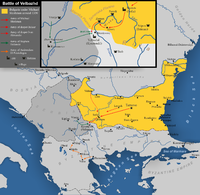Battle of Welbaschd
| date | July 28, 1330 |
|---|---|
| place | Welbaschd |
| output | Serbian victory |
| Parties to the conflict | |
|---|---|
| Commander | |
| Troop strength | |
| 12,000 Bulgarians, 3,000 Wallachians, Tatars and other mercenaries | 15,000-18,000, including German and Catalan mercenaries |
| losses | |
|
unknown |
unknown |
The battle of Welbashd on July 28, 1330 ( Bulgarian Велбъждската битка , Serbian Битка код Велбужда Bitka kod Velbužda ), in which the Serbian army defeated Bulgaria's troops as well as the Balkan peninsula in the 14th century , marked the breakthrough to Serbian power the ensuing decline of Bulgaria and Byzantium . It ultimately led to both empires (like Serbia itself later) falling into the hands of the Ottomans , laying the foundation for centuries of Ottoman rule in southeastern Europe.
The ruling dynasty of the palaeologists (1261-1453) was never able to regain the former dominant position of Byzantium in the western part of the Balkan Peninsula, but had to leave it to the Serbs . After Stefan Uroš II. Milutin (1282-1321) had conquered what is now North Macedonia from Byzantium in 1282 , he expanded his influence to Bosnia and the Albanian Adriatic coast . Orderly administration and the systematic increase in the economic strength of his empire characterize his long reign. The development of rich mineral resources (gold, silver, lead, copper, iron) provided the economic prerequisite for the splendid rise of Serbia in the 14th century.
Bulgaria and Byzantium, which were besieged by the advancing Ottomans in Asia Minor , did not want to accept this rise of Serbia and therefore decided to proceed together. Stefan Uroš III. Dečanski (1321-1331), however, came before the union of the Byzantine and Bulgarian troops and defeated the Bulgarian lord on July 28, 1330 in the decisive battle at Welbaschd (the Velebusdus of antiquity, today Kyustendil ). Tsar Michael III. Shishman fell in battle.
Course of the battle
Tsar Michael led an army of probably 15,000 men, including numerous Wallachian , Tatar and Yassi auxiliary troops that he had received at Vidin . His aim was to match his army with that of Andronikos III. to unite, which had posted itself in Pelagonia , and then to march together against Stefan Dečanski. But he was intercepted by Stefan Dečanski at Welbaschd.
According to historical estimates, Stefan Dečanski's army numbered between 15,000 and 18,000 men. In his army there were Catalan mercenaries, allegedly around 1,000 heavily armored horsemen, including former members of the Catalan company , as well as German mercenaries (according to Mavro Orbini in the 17th century around 1,300 German mercenaries, but this number will probably be exaggerated , since Orbini also has around 80,000 men in the Serbian army). Some of them, including the Catalan and German mercenaries, were held back by Stefan Dečanski as rearguard, led by his son Stefan Dušan . This gave Michael the impression that Stefan Dečanski's army was much smaller than his own and that he believed he was going to win. This impression was reinforced by Stefan Dečanski's summons to negotiations. Sure of victory, Michael was careless and made no special preparations against possible surprise attacks on his camp. Some Bulgarian historians even believe that Michael had concluded a peace treaty with Stefan Dečanski, which Dečanski failed to keep.
On the morning of July 28, the Serbian attack followed, which hit the Bulgarians completely unprepared. The first Bulgarian lines were broken. The Bulgarians retreated, but were intercepted again and finally defeated in a decisive battle in which Prince Stefan Dušan distinguished himself with his rearguard. Knowing about the Bulgarian defeat, Andronikos III also moved. from further actions against Serbia.
Aftermath of the battle
With the battle of Welbaschd, the Serbian state of the Nemanjids achieved the breakthrough to become the leading regional power on the Balkan peninsula, which had already emerged under King Milutin. However, Stefan Dečanski was cheated of the fruits of his victory: the co-ruling Prince Stefan Dušan , who had made a significant contribution to the success in the Battle of Welbaschd through his courage, had become very popular and was supported by a growing follower in the Serbian aristocracy. He could depose the king and take him prisoner; only a few months later he was killed trying to escape.
As the new king (1331-1355), Stefan Dušan built a Serbian empire that extended to the coast of Dalmatia and Albania in the west (with the exception of Durazzo , which remained the Anjous ), and in the south included Epirus , Macedonia and parts of central Greece North almost reached as far as Belgrade . On April 16, 1346 in Skopje he was crowned "Emperor of Serbs and Greeks" by the Serbian Patriarch .
The founder of the Principality of Wallachia , Basarab I , who was on the losing side, was attacked in the same year by the King of Hungary , Charles I Robert . Hungary tried to use the weakening of Basarab to restore its supremacy in Wallachia, but failed in November in the Battle of Posada .
literature
- Hans-Joachim Härtel, Roland Schönfeld: Bulgaria: from the Middle Ages to the present. Verlag Friedrich Pustet, Regensburg 1998, ISBN 3-7917-1540-2 , pp. 61-62.
Individual evidence
- ^ Härtel / Schönfeld: Bulgaria: from the Middle Ages to the present. P. 62.
- ↑ Ekkehard Völkl: Basarab I. , in: Biographisches Lexikon zur Geschichte Südosteuropas . Vol. 1. Munich 1974, p. 143 f.

